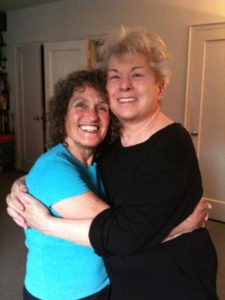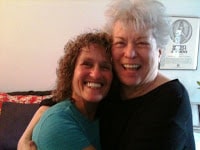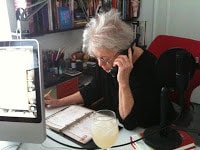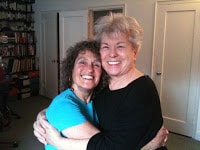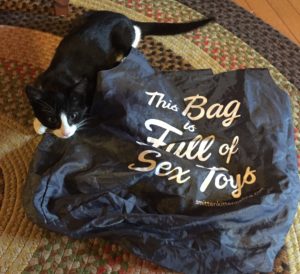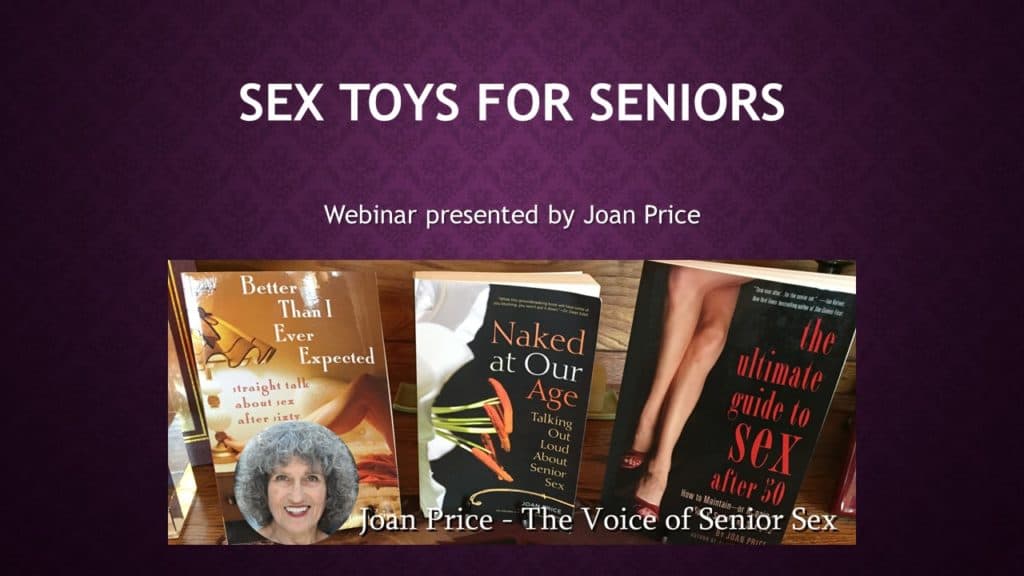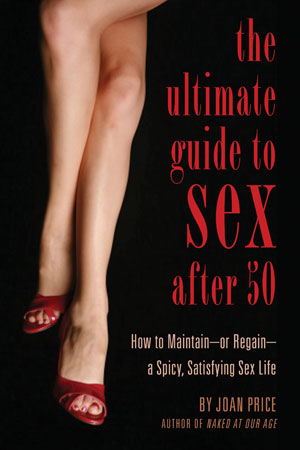Posts by Joan Price
Bonding with Betty Dodson
11/8/2020: Betty Dodson died October 31, 2020, at age 91. I’m republishing this post from 7/12/11 to celebrate Betty’s life. Dear Betty, thank you for living audaciously and authentically and for teaching us so much about our right to sexual pleasure!
“There’s that pushy broad who drove me crazy!” I heard from inside Betty Dodson‘s apartment as I rang the doorbell.
Although Betty and I had corresponded by email, and she had written the fabulous foreword to Naked at Our Age, we had never met in person. Now, on this trip to New York in 2011, I was about to have the opportunity and pleasure of spending a couple of hours with this icon of sexual empowerment.
But — “drove me crazy”? Was she referring to me? Her memory was that I pursued her relentlessly until she agreed to write the foreword to Naked, after she told me a thousand times she was too busy.
My memory was that she had told me once that she was too busy. I had said, “Just read the table of contents and one chapter of the manuscript, and then tell me whether you can make time.” She had done so and said, “I’ll do it.”
I laugh at my unreliable memory a lot these days, and so does Betty at almost 83, though she’s as sharp, smart, and witty as any three young people combined, so maybe her version is right. Regardless, she loves the book and believes in my mission.
We bonded immediately. Within two minutes of my arrival, Betty lifted her tunic and flashed her bare booty at me, saying, “I haven’t finished getting dressed yet.”
“Woo hoo! Do that again,” I said, grabbing my cell phone camera. She repeated the action several times so I could get a good photo.
“May I post this on my blog?” I asked, showing Betty the best shot.
“Absolutely not!” she replied. So Betty Dodson’s naked butt resides on my phone photo gallery exclusively — sorry, folks!*
Betty gave me a tour of her apartment and showed me some of her extraordinary artwork. She took a couple of phone calls while I was there, from TV shows and interviewers. She’ll be celebrating her 83rd birthday at a huge event in Norway, is working on video projects, and is in no way slowing down. See her projects on her website: http://dodsonandross.com/.
Betty introduced me to the lively and lovely Carlin Ross, her business partner, who was sitting behind one of the three microphones set up in Betty’s bedroom/office. Carlin informed me that we were recording a podcast together. Oh!
The three of us chatted for an hour about senior sex, sharing and laughing and having a fine time.
I left Betty’s apartment joyful and even more impressed with Betty Dodson than I had been two hours before. What a woman. She called me “sister warrior” in an email after she read Naked at Our Age. On this day, she called me “friend.”
* 11/8/2020 update: Now that Betty is no longer here to object, is it time for me to share her naked butt photo? Nope. I pride myself on being trustworthy. But I’ll show you one of her paintings:

Painting by Betty Dodson
Sex toys “from a senior perspective”?
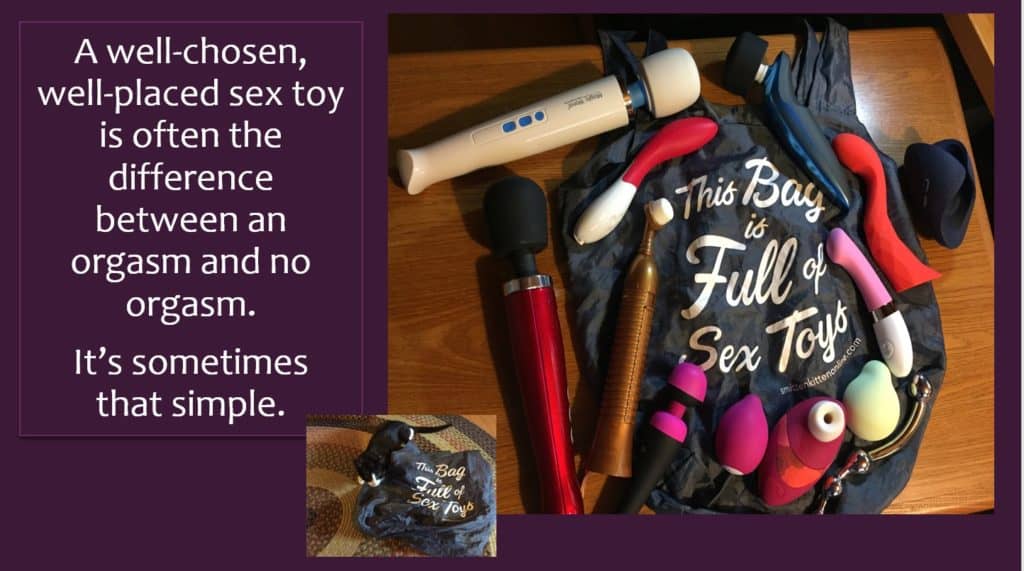
I’m often asked what I mean when I say that I review sex toys “from a senior perspective.” What’s a “senior perspective” and how do our senior needs differ from younger folks?
- We need vibrators that can go as long as we need to arouse our slow-burning bodies without overheating or running out of charge.
- We want ergonomic sex toys that don’t strain arthritic wrists.
- We need sex toys made from body-safe materials. (Aren’t they all? No.)
- Vulva owners who enjoy vaginal penetration may require a slim fit for comfort.
- Penis owners with erectile challenges need sex toys that don’t require an erection to use it.
- We want to see and differentiate the controls without putting on our reading glasses.
- We want to be able to adjust the controls by touch, despite slippery, lubed fingers.
- Above all, we need intensity: strong vibrations. We’re battling our (lack of) hormones, people.
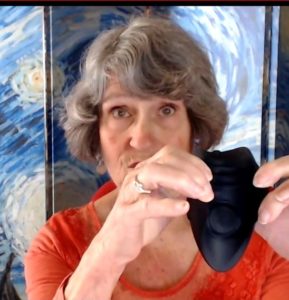 That’s why I say I review sex toys from a senior perspective. Is there anything you would add to my list?
That’s why I say I review sex toys from a senior perspective. Is there anything you would add to my list?
To see the whole list of vibrators and other sex toys reviewed on this blog, click here. Keep scrolling to “older posts,” because I’ve reviewed a lot of them! You’ll also find my webinar “Sex Toys for Seniors” informative and enjoyable.
I welcome your comments on my reviews, whether you agree or disagree. I’m just one person, and our preferences vary. Whether a toy works for me may depend on “fit” as well as preference, and it’s useful for all of us if you post your own experience in the comments section.
7/19/2020: I’m updating this post from 2011 to answer a reporter’s question. You might have wondered this also!
Solo Sex is Real Sex
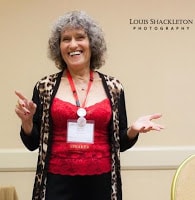 March 2020: I’m spotlighting this post, originally written for Valentine’s Day 2016, for a couple of reasons: (1) I have so many new readers now; (2) This post drew some marvelous reader comments, and I hope to encourage more!
March 2020: I’m spotlighting this post, originally written for Valentine’s Day 2016, for a couple of reasons: (1) I have so many new readers now; (2) This post drew some marvelous reader comments, and I hope to encourage more!
“We need to acknowledge that solo sex (solo masturbation) is real sex,” I asserted, and ten people in the audience quoted me on Twitter immediately. I was speaking at the Woodhull Sexual Freedom Summit in August 2015. This was my first time attending Woodhull, and it was an amazing experience:
The Sexual Freedom Summit features human rights activists, sexuality educators and researchers, professionals from the legal and medical fields, authors, sexual freedom movement leaders and organizational partners all working toward the time when sexual freedom is fully recognized as a fundamental human right.
It seems to me that “sexual freedom” includes freeing ourselves from our society’s outdated notions, especially as they restrict us, as seniors, from full sexual expression. No one is standing at our bedroom door proclaiming, “Thou shalt not masturbate” — at least I hope not — but many of us have internalized the idea that giving ourselves sexual pleasure is wrong, or a depressing substitute for “real” — aka “partner” — sex.
At our age, accepting self-pleasuring as “real” sex is even more important than it was in our youth. Here are some reasons:
- Many of us do not have a sexual partner at this time of our lives.
- Many of us who do have a partner are not able to have full sexual expression with that partner, due to medical or relationship issues.
- Our retreating hormones and decreased blood flow make it easy to forget about sex because there’s less urgency. Yet the less we experience arousal and orgasm, the more difficult it is to get there when we want to.
- Our responses change as we age, and the most direct way to stay in tune with what we need for sexual pleasure is to experiment with our own hands — and, of course, sex toys.
- Sexual arousal and orgasm are good for physical and emotional health. In The Ultimate Guide to Sex after 50, I list 33 reasons why sex is good for you — and by sex, I mean with or without a partner.
 For those of you who would tell me (as people do, surprisingly), “Hey, masturbation is inferior to sex with a loving partner,” I would answer, “There’s nothing inferior about sex with the person who knows you best.” Plus the obvious — “How nice that you have a loving partner. Many of us don’t.”
For those of you who would tell me (as people do, surprisingly), “Hey, masturbation is inferior to sex with a loving partner,” I would answer, “There’s nothing inferior about sex with the person who knows you best.” Plus the obvious — “How nice that you have a loving partner. Many of us don’t.”
Whether we’re pleasuring ourselves because it’s sex with ourselves or no sex, or we enjoy private sex, or maybe we just want to have fantasy sex with Jeffrey Dean Morgan, let’s agree that solo sex is not only real sex — it’s delightful sex.
Readers of my Naked at Our Age Facebook page (which I hope you’ll “like”), had this to add:
- We are 58 and 57 and we both enjoy solo sex. Sometimes, we do it together. Watching can be quite erotic but more often, we’ll do it before bed (usually separately in that case) to help us sleep. Mrs. has a variety of vibrators and we’re both definitely in favor. – Mr. and Mrs. Average Joe, erotica author.
- I’m a 67 y.o. man, and in the famous words of Woody Allen, I’m good at sex (with women) because I practice a lot when I ‘m alone. (;-). Seriously, it has a lot to do with why I’m still so erotically alive. And yes, incorporating mutual self-stimulation into play with partners is really exciting, and in some ways can feel even more emotionally intimate than PIV [penis in vagina].
- I’m 53. I have been going solo for the past 11 years (not by choice), now that I am single I am looking forward to having a partner once again. The solo sex has been a necessity!
- I am 50. In my community sex is forbidden to singles and there is controversy about whether masturbation, therefore, is ‘sinful.’ My stance is masturbation is not sinful and not forbidden to those of us who are unmarried. I think “Solo Sex is Real Sex” but my Christian community may not accept such a statement.
- I am 58 and flown solo for quite a few years. On the one hand, it’s nice because I know all the best places and the exact technique. On the other, it’s obviously not as much fun as having a partner. However, that’s not always possible and I much prefer it over climbing into bed with a jerk. I wish I had more money for some of the great toys you’ve shown. I might never want a partner again if I did.
As Valentine’s Day approaches (note: I originally wrote this post for Valentine’s Day) and we’re bombarded with commercial messages about how to make the day more romantic with our loved one (soft lighting, mellow music, gifts of chocolate and roses included), let’s remember this:
Love starts with how we feel about ourselves, how giving and patient and accepting and loving we can be with the person who’s been in our life the longest. Let’s celebrate that with our own special touch (so to speak).
Go ahead and call me a “little old lady”!
In January 2007, in the early years of this blog, I wrote a post titled, “Don’t call me a ‘little old lady'”!” Thirteen years later, my feelings have completely changed. Here’s what I wrote then:
I’m always surprised by how acceptable it is in our society to call older people disparaging names.
I was reading a newspaper article today about Barack Obama’s popularity in Illinois, which quoted Emil Jones Jr, president of the Illinois Senate, as saying, “Sitting across the table from me was a little old lady, said she was 86 years old,” who hoped she’d live long enough to vote for Obama for President.
I was startled by reading this mature woman described as “a little old lady,” and I didn’t like it. OK, I’m little (4′ 10″), 63 years old, and female — but “little old lady” belittles my maturity and experience and sounds like it would be uttered while patting me on the head. Didn’t the 86-year-old elder deserve a more dignified description? If she had been male, would she have been described by Mr. Jones as “an old geezer”?
…I know there’s no consensus about what to call older people without offending us! I like the term “senior,” although I know some dislike it. I like “elder” because it connotes wisdom and sounds respectful, even reverent — but I don’t feel old enough to deserve being called an elder. “Mature” is a nice adjective, though “mature adult” sounds stilted.
Here’s how I feel now: If a little old lady can make her living writing and speaking about senior sex — which I do — and keep her body strong by teaching line dancing, practicing Pilates, and walking miles a day — all of which I do — then go ahead and call me a “little old lady.”
I feel I can own, even enjoy, being called “little old lady” at this time of my life. I’m little (4’10”) and old (76), and my life is thrilling, so what’s the problem? I’ve also grown into the term “elder” (though not “elderly,” please).
When Gloria Steinem turned 40 and a reporter told her she didn’t look 40, she said, “This is what 40 looks like!” We continue to redefine what aging looks like, feels like, and acts like. Join me!

“Little old lady” at age 75
Q to you: How do you feel about being called “senior,” “old,” and so on? I invite you to comment. You’ll see 18 comments from the first post — let’s add to those. I know we won’t all agree, so please disagree politely.
